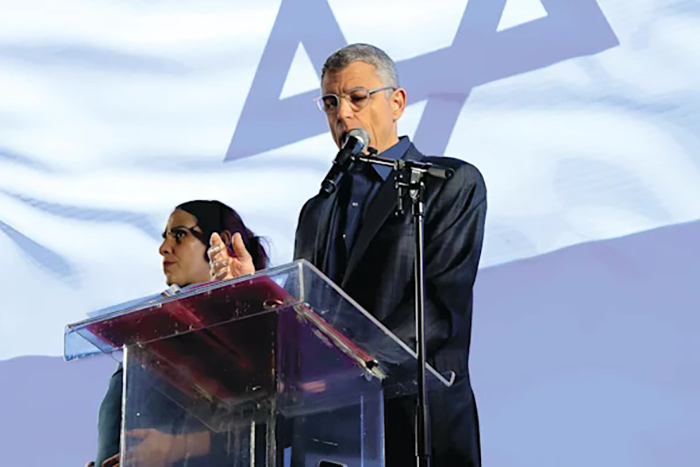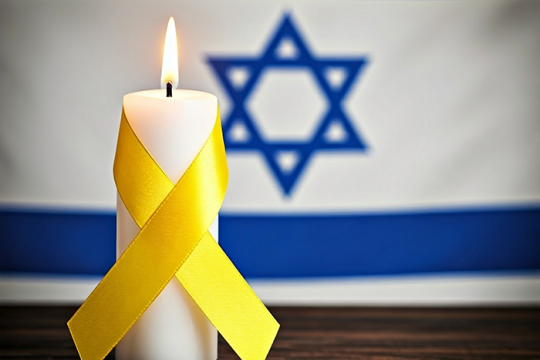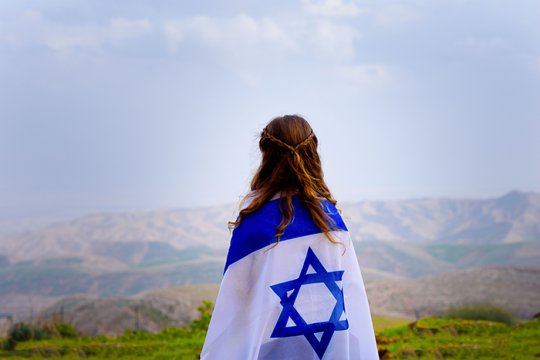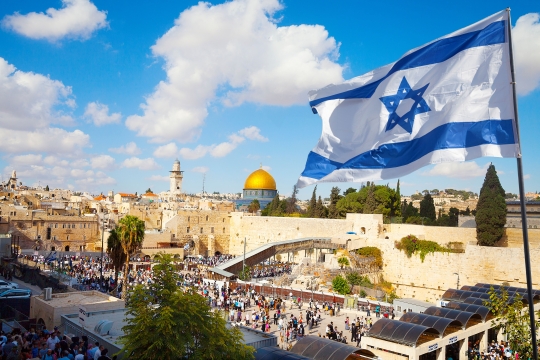
Photo by Tamir Elterman
This interview was originally posted in Hebrew in The Globes.
"These are really challenging times for Jews everywhere," Rabbi Rick Jacobs, president of the Reform movement in the US and North America, tells us. Jacobs is one of the most influential Jewish people in the world, but the Israeli public does not really know his name - and probably Nor do I know enough about Reform Judaism.
"We are the largest movement in the Jewish community in North America," he tells Globes. And indeed, the Pew Institute survey from 2020 indicates that about 37% of American Jews define themselves as Reform, 17% as Conservative, 9% as Orthodox, 4% as belonging to another stream and 32% not belonging to any stream. "Much of this growth It has been since the Second World War, because Jews tried to find a modern expression, but also inspiring."
Ariel Whitman from The Globes: And what about the 2 million Reform Jews in the USA? How did they experience October 7?
"It was a tragic blow to the entire Jewish people. People were scared and shocked. I personally had very close friends in the Gaza Envelope. We had no scale, but people entered the synagogue that morning and broadcast that something catastrophic was happening.
"In the Reform movement far and wide, and to be honest in all the organizations of the establishment Jewish community, there was a shiver of pain and loss, and then we quickly moved to the knowledge that we must stand up and protect Israel. We knew that it would not be long before the world would push aside the atrocities and that we would have a role to fight this, to make sure that Israel will have the support it needs.
"For some people, I'll just be honest, Israel was very far away - maybe they visited there once, maybe the child did a bar mitzvah there, but not beyond. Now it's become personal and we've seen a leap and increase in commitment and connection."
"On October 8 we demonstrated in favor of Hamas"
The day after October 7, in Times Square, we saw mass demonstrations against Israel. How did it feel to be there at that time?
"On October 8, it was not solidarity with the Palestinians. It was not a call for a two-state solution. It was not a demand for rights for the Palestinians, it was in favor of Hamas. And it was shocking, I think, to any normal person. After all, the videos had already started circulating on the networks "
What about protests on campuses?
"The demonstrations on the campuses were more diverse," Jacobs answers cautiously. "Opposing this war is not necessarily an immoral position. However, one must understand that Israel did not choose the war, the war chose Israel - and Israel had to defend itself and also prevent a future 'October 7'.
"We want the war to stop. The price of the war is enormous, for Israel and for innocent Palestinian citizens. We hear a similar message from Rachel Goldberg-Pollin, the mother of the late Hersh. She persisted in declaring: Let's save the abductees, not just my son, but all of them, and put an end to the suffering there.' And some people at first said: sorry, is this really the requirement? And she and her husband said that there is no competition in suffering. If you have empathy for the innocents in Gaza, you don't necessarily fully support Israel's need to defend itself in this just war."
It is difficult for many in the West to grasp the evil we have seen. How were you able to convey this to your communities?
"Many of us had relationships with people who were harmed and faced this evil. I used to be in Otef with Amir Tivon (a resident of Nahal Oz, who stayed there with his family members during the attack until his father Major General Noam Tivon came to rescue them - AO). We know that many in the Gaza Envelope were among the most prominent people of peace, whose lives were dedicated to building bridges with the people of Gaza. I think there was already a deep sense of complicity with some of the people who suffered the most. In each of our communities, and I have been to many in the past year, they did not miss the daily and weekly call to action to return the abducted. Everyone asks all the time, what can we do? What should we do?
"The concern is still enormous, and when we start a new year many of us feel apprehensive. There is still the deepest possible loss and 101 kidnapped. So I think that in our synagogues during the holidays there will be many sermons about what happened and what is yet to come."
"To make sure that Judaism will speak to the current generation and be relevant"
What does it actually mean to be a Reform Jew?
"This is a response to modernity. The Jewish tradition has always developed and made changes. So we made significant changes in the Reform movement, and we are still making them. To make sure that Judaism would speak to the current generation and be relevant for it, changes began that reflected our values, of equality and justice. One of the most significant was the ordination of women as rabbis. We try to stay true to tradition, but not get stuck.
"The movement is made up of people who aim for prayer to be meaningful, for Torah study to be relevant to our times and for us to apply our Jewish values through action and social activism. This is another expression of commitment - how do we shape a world that is more just, rewards more kindness and is full of hope."
What about Israel and the reform movement? The Orthodox establishment sets the rules and the tone, and it seems that many of Israel's citizens are not interested in Reform Judaism.
"First of all I say the obvious - the ultra-Orthodox really control the religious space, so it's like swimming against the tide. However, the reform movement and the conservative movement are growing in Israel. What we would like is for the children of Israel to be taught in the education system the idea that there is more than one way to be a Jew, and even a Jew -religious.
"The Chief Rabbinate and the ultra-orthodox parties control what can be done in the country in the religious field. As a Reform rabbi, I cannot arrange a Kiddush, and I have to be very persistent even in the case of a funeral in Israel in order for me to have a proper place and role. We are there because I think Israelis want a Jewish expression in moments of joy and sorrow in life. We are not against any current in Judaism. We are simply an important and no less authentic expression of Judaism, and we should be given a place."
In this context, I ask Jacobs about the "Wall Outline", the arrangement that the government approved in 2016 but which Prime Minister Netanyahu froze after threats from the ultra-orthodox parties that they would withdraw from the coalition. The layout was supposed to significantly expand the egalitarian and mixed prayer plaza, which was established in 2013 in a separate part on the southern side of the Western Wall; connect it so that the entrance to it is from the main extension; to budget it with at least NIS 5 million per year; and entrust its management to a council with representatives of the non-Orthodox sects and the Women of the Wall organization. None of this ever happened.
"Our goal was never to displace ultra-Orthodox or traditional Jews, who want to pray as is their custom at the Western Wall, separating men and women. We wanted a separate, equal space. We thought it was a good solution, 'One Wall for one nation'. Why shouldn't there be a place for all of us? But it wasn't Accepted by the ultra-Orthodox/Orthodox establishment and it was not finally implemented due to political pressure. However, we are not giving up - because this is the right solution for the Jewish people."
Monopoly is also problematic in religion. When the rabbinical establishment uses politics to block competition, it first of all harms the halakhic world, which remains inaccessible and has no need to improve.
"That's for sure. There isn't really a religious establishment in the US. No group receives a special stipend from the government, and as a result all Jewish communities are in the same game of creating meaning and having a positive, important and inspiring influence. This is also part of the reason we get along and there is more respect between the different groups, so I can meet with the leadership of Chabad in a respectful and open manner. This is how our local communities also study in Elul for the holidays in collaboration with Orthodox communities. This is typical here, it is quite standard." .
I don't think this can happen in Israel today.
"You don't find it at all in Israel, and it's a shame."
Disappointed with the allies but not giving up solidarity.
Rabbi Jacobs was born in New York and grew up in California and over the course of two decades studied at the Shalom Hartman Institute in Jerusalem, where he serves as a senior rabbinical fellow. In 2011 he was unanimously elected to serve as the leader of the Reform movement in North America, after 20 years in which he was the chief rabbi of the Westchester Reform Synagogue, in Scarsdale, New York. Even before that, he served as the rabbi of the Reform community in Brooklyn Heights.
He is an enthusiastic supporter of Israel as a safe, Jewish, democratic and pluralistic country, and works hard to strengthen the reform community in Israel. Jacobs referred to the fact that many Jews who identify as reformers participated in the protests held across the US following October 7 and the war in Gaza: "There were many on the extreme left of the progressive movement who joined the protests for the 'ceasefire now.' Some of these kids grew up in our movement and my goal was to stay in touch with them, not to say they're wrong. I wanted them to experience some of the other dimensions of this horrific attack. People think that Israel exists in some ideal place and that is simply not true."
Many of the progressive Jews, a significant percentage of whom are Reform, feel that their allies have turned their backs on them. Jews went to Black Lives Matter protests, to donate and volunteer for minority communities, the LGBT community. Then October 7th happens and some of them really betrayed them. Do you feel that?
"I haven't lost all the deep relationships I had with people who lead Christian, Muslim communities , and also with people who are part of the very progressive causes in which we are very involved. Yes, there were some that honestly I'm not only disappointed in, but really broke my heart. There were people who didn't just protest Israeli actions, they protested our very existence. These are ties that will probably never heal."
"But many of the people we worked closely with expressed sympathy, some of them said it in person, in a conversation or in a message. My response in many of these cases was: Why don't you say it publicly? What about a statement? Can I read what you said to me here in the newspaper as well? There were those who spoke, wrote, signed in support of the Jewish community, so I don't want to say absolutely that they all abandoned us, but there were those who did.
"The goal was to stay connected, to see if we could bring some of these people back. If Jews are not going to be part of coalitions of people fighting for women's rights, civil rights, the rights of the black community, for the basic idea that every person has intrinsic value - then we have lost. We will not be able to create Security is only with cameras and security guards. We also put the cameras and the security guards. But part of what we need to do is to continue to create a better world."
Since October 7 we have heard scandalous statements against Israel and also against Jews. Many times, as you said, also from the progressive allies. What should be done?
"First of all, not to let things be said without comment. It is also very important that we find the ways to reveal the smaller details. For example, when people say 'from the river to the sea' then some of them did not know which river and which sea. We want two states, we want 2018. It is possible to understand the clear message that rejects the political solution in which two peoples will live side by side, and calls for a world without the Jewish state.
"We need to be vigilant and be visible in the media. My colleagues and I regularly appear and write in the American media to counter these ideas. Some of the things that are said from the progressive side are scandalous. Some of them quietly repeat ancient anti-Semitic stigmas. A new type of anti-Semitism has arisen here, which is real. A quarter of Jews In North America they say they experienced anti-Semitism, it's terrible."
It is challenging to be Jewish at a moment like this?
"Some in our community hesitate to express their Jewish identity in public. But we will not panic in the face of the distress and threats. I stand in the middle of the bustle, traffic and noise of New York, wearing Jewish symbols and proud of my deep connection to Israel."
Does the federal government have a role to play or does it fall to the local and state governments?
"The administration, headed by President Biden, has established a government task force on anti-Semitism, from the more serious reactions we have seen on the subject. We meet regularly with the US Attorney General, the head of the FBI, the Secretary of Education and the Secretary of Homeland Security. Their job is to protect us. The government people definitely prioritize our safety. I would say there was a significant response from the federal and local government."
"You can disagree about the government and still love Israel"
Before October 7, Israel was in an uproar following the legal reform and many of the protests reached the Jewish community in the US. How does an American Jew, in this case a Zionist and progressive Jew like you, look at it?
"In February 2023, I was the first non-Israeli to speak at the Kaplan protest. It was amazing, there were about 150,000 people, and I wanted to bring a voice of love for Israel and support for the rule of law and the Supreme Court - the fundamental institutions that enable and realize democracy - but also to do it out of Jewish values. The year leading up to October 7 was very challenging for many of us, and the current Israeli government is really hard to digest for those of us who love Israel, and we are also liberal Jews."
Jacobs has controversial views on the government, and although they can be interpreted as extreme, he does not back down from them. "When Bezalel Smotrich was nominated to be the Minister of Finance and Itamar Ben Gvir to be the Minister of National Security, I said very loudly in the media that it would be like appointing David Duke (one of the leaders of the Ku Klux Klan - AO) to be the Attorney General of the United States. I was told that it was terrible to say That and I replied that it may be terrible, but I believe it is accurate.
"So we, the Jewish liberals, loved Israel before October 7th, and we love it very much after as well. This does not mean that we have to agree with the Israeli government. This does not mean that we have to say that the violence of certain settlers towards Palestinians is acceptable to us, or that we support who who is taking advantage of the moment to try to change the status quo on the Temple Mount, things that could lead to a third world war. We want to make it clear, especially among our young people, that it is not only acceptable to disagree with the government and still love Israel."
Netanyahu has been harshly criticized for making the Israeli issue partisan and divisive in the US, and alienating the Democratic Party from Israel. Do you think this is true?
This is what kept Israel alive for decades, and the support was in Congress and the White House, no matter who was there. Israel was in consensus. Netanyahu acted the way he acted and now it is part of politics. However, when it comes to votes like on military aid then you see it's still bipartisan, but it's weakened by this kind of behavior. Actions have consequences. This is one of the things we are going to pay for for a long time."
Related Posts

Marking this Moment: Resources for the Release of the Hostages

I’m a Rabbi. Here is Why my Faith Tells Me the War in Gaza Must End.
